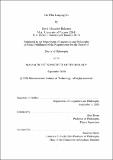On what language is
Author(s)
Balcarras, David Alexander.
Download1227180204-MIT.pdf (646.6Kb)
Other Contributors
Massachusetts Institute of Technology. Department of Linguistics and Philosophy.
Advisor
Alex Byrne.
Terms of use
Metadata
Show full item recordAbstract
What is language? I defend the view that language is the practical capacity for partaking in communication with linguistic signs. To have a language just is to know how to communicate with it. I argue that this view -- communicationism -- is compatible with its main rival: the view that we know our language by tacitly knowing a particular generative grammar, a set of rules and principles pairing sounds with meanings. But only communicationism gets at language's essence. Moreover, the rival view may be false, for there is in fact little reason to think we tacitly know grammars. In chapter 1, I argue that communicationism is compatible with the view that language is constituted by tacit knowledge of grammar because the brain states that realize grammatical knowledge do so because they enable us to know how to linguistically communicate. In chapter 2, I offer further reasons to accept communicationism. The starting thought that we know how to communicate by knowing how to use sentences in a particular rule-governed way in order to express our thoughts is developed into a use-based account of meaning, on which all expressions have their meanings because we know how we use them to mean things. In chapter 3, I explore the extent to which language use is enabled by unconscious representations of grammatical rules. In particular, I consider whether linguistic understanding is enabled by tacit knowledge of compositional semantics. I argue that it is not. Language comprehension and production can be explained without appeal to tacit knowledge of semantics, by instead appealing to our subpersonal capacity to translate natural language sentences into the medium of thought. I conclude that there does not seem to be any reason to believe in tacit knowledge of grammar. Finally, in chapter 4, I survey proposals about what it would be for a speaker to tacitly know a grammar, and argue that they are all inadequate. I conclude that linguistic meaning cannot be explained in terms of tacit knowledge of grammar. Rather, it should be understood in terms of the practical knowledge that manifests in intentional linguistic action, rather than in terms of that which might underlie it.
Description
Thesis: Ph. D. in Linguistics, Massachusetts Institute of Technology, Department of Linguistics and Philosophy, September, 2020 Cataloged from student-submitted PDF version of thesis. Includes bibliographical references (pages 169-185).
Date issued
2020Department
Massachusetts Institute of Technology. Department of Linguistics and PhilosophyPublisher
Massachusetts Institute of Technology
Keywords
Linguistics and Philosophy.